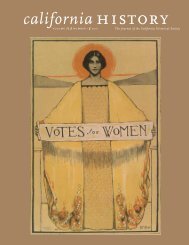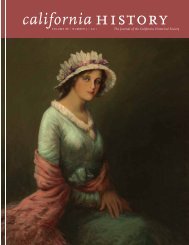Volume 90, Number 1 - California Historical Society
Volume 90, Number 1 - California Historical Society
Volume 90, Number 1 - California Historical Society
You also want an ePaper? Increase the reach of your titles
YUMPU automatically turns print PDFs into web optimized ePapers that Google loves.
24<br />
The historian Elena Lourie notes that Muslims<br />
may have used the practice of ribat to conquer<br />
Spain in the eighth century. 18 The Almoravides,<br />
a fundamentalist group from northern Africa<br />
that came to Spain in 1086, considered ribat an<br />
important act of worship. They used the practice<br />
of ribat to train young men in a monastic<br />
setting where they prayed and participated in<br />
military drills. 19 As for the Almohades, another<br />
fundamentalist group from Africa that arrived in<br />
Spain in 1147, it is not clear how they regarded<br />
ribat. But it is unlikely they would let the practice<br />
lapse. 20 Some scholars contend that ribat<br />
lost its military character by the twelfth century<br />
and emphasized prayer and study. Nevertheless,<br />
the more militant expressions of ribat endured<br />
for some time. As late as 1354, Ibn Hudhayi,<br />
a scholar from Almería in southern Spain,<br />
described ribats as fortresses that defended Muslims<br />
from Christian advances. 21<br />
If Muslims in Spain associated ribat with war,<br />
they could consult sacred texts to confirm the<br />
connection. 22 It is not enough to cite Quranic<br />
passages that speak about the believer’s duty<br />
to do battle. 23 The attitudes that emerge in the<br />
Qur’an are more telling. The religious scholar<br />
Richard Martin explains that in the first centuries<br />
after Muhammad’s death many Muslims believed<br />
that it was their duty to supersede the flawed<br />
tenets of Christianity and Judaism and convert<br />
humanity to Islam. Once the world accepted the<br />
one true faith, Muslims would restore the perfection<br />
that God had created at the beginning of<br />
time. To set individuals “on the path of God,” it<br />
was incumbent on believers to “command the<br />
good and forbid evil.” 24<br />
When Islam was slow to spread, at least by the<br />
reckoning of some Muslims, the world could<br />
assume a stark, violent cast. The faithful, along<br />
with unbelievers who acknowledged Muslim<br />
authority, dwelled within Dar al-Islam, the House<br />
<strong>California</strong> History • volume <strong>90</strong> number 1 2012<br />
of Islam. Beyond emerged Dar al-Harb, the<br />
House of War, the regions where infidels resisted<br />
Islam’s advance. With humanity divided, and<br />
abiding in uneasy accord, Muslims could use<br />
violence to subsume the House of War within the<br />
House of Islam. Until the conversion of all, or<br />
at minimum until the infidels honored Islam’s<br />
primacy, peace would never prevail. Any cessation<br />
of hostilities would be but a truce, according<br />
to Martin, and once conditions proved favorable,<br />
the faithful would press the attack to make Islam<br />
supreme. 25<br />
If war was to be, the believer could learn how<br />
his efforts on the battlefield would bring divine<br />
reward. Many Muslims in Spain followed the<br />
Malikite school of jurisprudence, one of four<br />
schools of thought recognized by the Sunnis,<br />
the largest branch of Islam. The Malikites took<br />
their name from Malik ibn Anas, a Muslim<br />
scholar from the eighth century who compiled<br />
the Muwatta, a collection of teachings attributed<br />
to the prophet Muhammad and his companions.<br />
26 Malik emphasized the simple, unadorned<br />
piety of the first Muslims—Muwatta means “the<br />
simplified”—in which the faithful remembered<br />
their obligation to make Islam a universal religion.<br />
By the ninth century, the Malikites had<br />
established themselves in Spain as the jurists<br />
and scholars whose interpretation of Islamic<br />
law influenced the course of daily life. With the<br />
Muwatta in hand, some Malikites declared that<br />
should a believer kill or be killed, the shedding of<br />
blood amounted to a sacrifice whose significance<br />
increased his status and the blessings he would<br />
accrue in the afterlife. Verse 21.15.34 instructs<br />
the warrior that “the bold one fights for the sake<br />
of combat, not for the spoils. Being slain is but<br />
one way of meeting death, and the martyr is the<br />
one who gives of himself, expectant of reward<br />
from Allah.” 27<br />
The consecration of war deepened over time. By<br />
the mid-ninth century, scholars in ancient Persia<br />
and elsewhere composed siyars, histories of









